The Indian Retail Industry is considered as one of the fastest developing sectors of the country as it continues to take giant steps towards becoming organised. The sector is rated as one of the pillars of the Indian economy and accounts for about 10 percent of the GDP. India is one of the top-five retail markets globally currently, worth approximately US $600 billion in economic value. However, the success of the retail market is completely dependent on retail brands, then be it large players or the smaller ones, older or new brands, start-ups, shopping malls, -and-mortar stores, warehouses, e-tailers, franchise models, etc. It is very important that these brands to be successful so that they can contribute to the success of retail fraternity. The success of these brands and companies depend on one individual, who is the Chief Executive Offi cer (CEO) of the company. He determines the vision of the brand and leads the company on the path to growth
CEO Vision 2030
Every company wants to be successful. Today, in the era of digitalisation, phy-gital retail, Omnichannel commerce and e-commerce, becoming a success is a tough ask. The path leading to the top of the retail chain doesn’t just include running the business and generating revenues but requires a working knowledge of technologically by CEOs alongside with them being updated with all the latest trends in the industry. While the big picture doesn’t often change, the details of the story must adapt to constantly changing business conditions. Therefore, it is the duty of the CEO to keep the vision of the company fresh.
Fine-tuning and updating the vision is a never-ending process of unraveling a paradox. It entails a number of elements. The CEO is in a good position to communicate how the company is living up to expectations with timely anecdotes and facts about success. Consistent direction from the top is critical to driving outstanding performance. The best CEOs enable communication about the vision to fl ow consistently both to and from them.
In its annual edition, IMAGES Retail brings you a comprehensive list of CEOs and retail heads, who are leading the change with the way they manage their brands, integrate technology in their workspace and let consumers be the voice of their brand to understand the future of the industry. In an exclusive one on one interaction, these stalwarts talk about the company’s growth, vision and future plans which would determine the position of the brand by 2030.
1. ARVIND KUMAR, CEO, DUKES INDIA
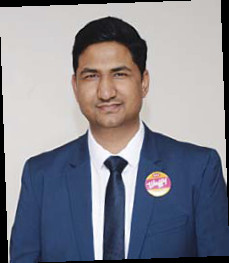
Arvind Kumar hails from a simple background and had a very transforming journey before he became the CEO of Dukes India. He joined Dukes as a Management Trainee in early 2010 from where he rose to become CEO. Today, he is leading the organization, taking it to greater heights. From handling operations, logistics, manufacturing, accounts, IT, sales, marketing, branding and management, Kumar has handled all disciplines of Dukes and has driven the business growth rate successfully in each segment.
Where do you see your sector in the next 10 years?
The food industry will continue to present a great opportunity and innovation. In baking space, I see the per capita consumption of biscuits to increase by 50 percent and bottom of the pyramid playing a major role in driving the consumption story. In the consumer front, I see a lot of value-added products taking up the share from basic biscuits with better distribution and availability through e-tail to the last mile. At Dukes, we have also envisaged e-commerce platforms competing with retail and e-tail with better logistics, connectivity and cost improving with Third-Party Logistics (3PL).
What are the Top 3 retail innovations in your opinion?
The top innovations are: AR, last mile delivery by e-tail v/s e-tail pickup points in vicinity and physical presence of e-tail brands/chains.
How important is O2O synergy in your opinion?
O2O space is becoming very interesting with e-tail giants looking to buy retail players/partner with them. Subsequently, retailers are creating a space for consumers to buy online and get the products from offline stores/delivery points. We see this a very important strategic step where synergy and presence in online and offline are critical factors to capture the moment of truth – to get consumers buying, with the ease and convenience of both worlds thrown in.
What technological/innovative in-store and online experiences have you introduced to your brand?
We are in the process of creating innovative consumer experiences at the right touch-points driven by technology and delivery platforms, which we will reveal at the appropriate time Is sustainability something you and your brand are actively working towards? Tell us in detail. At Dukes, we believe in sustainability and also actively work for it. Our R&D department has proposed many ways and means in manufacturing and packaging as well as in every decision. We conduct regular training for our team in sustainably.
What are the future plans for your brand? How has the company grown under your leadership?
Currently, we are exploring healthy snacking category which is poised to grow fast. We are also focused on expanding our presence in existing categories like cream wafers, biscuits, chocolates and confectionery segments. The company is in a growth trajectory and is growing in high double digits. With the change of culture with the employee being the center of it, Dukes is here to deliver delight to consumers.
2. AKHIL SRIVASTAVA, MANAGING DIRECTOR, PARFAIT INDIA
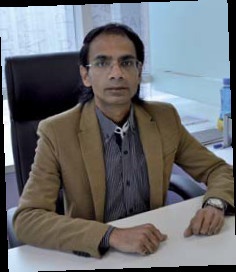
Akhil Srivastava has been working with the retail industry for over a decade and has experience of undertaking and leading roles involving retail consulting, new store planning, visual merchandising, brand promotion, SCM and Logistics etc. He has worked with brands like Walmart, Landmark and Times of India, before joining as the Managing Director of PARFAIT India.
Where do you see your sector in the next 10 years?
The plus size fashion industry is growing at a rapid pace and it is estimated to grow by more than 35 percent in the coming years. The increase in GDP, population, increase in the purchasing power and higher standard of living especially plays a vital role in giving a boost to this sector. The industry is expected to enter the category segment from sub-category sector and the under-served sector will see tremendous growth in the coming years.
What are the Top 3 retail innovations in your opinion?
The top three innovations as per me are: E-retail, Customer engagement activities and Personalization & customisation
Does your brand have an Omnichannel/ Phy-gital strategy?
Yes, we do have the Omnichannel strategy. We entered India last year and commenced our operations through offline and online retail partners majorly to test the waters and observe the consumer behaviour and gauge their reaction. We are already present in the Northern and Western region of India through shop-in-shops and pan India through online platforms. Gradually, we will get into franchisee model and utilise the complete potential that the business model has to offer. Alongside we also plan to open Parfait’s standalone stores starting with Delhi NCR region and moving to other metro cities.
What are the future plans for your brand? How has the company grown under your leadership?
We will continue to spread awareness amongst the female members of the society and educate them about the importance of wearing the right lingerie. Alongside, we will be penetrating in Tier I & II cities to create a loyal customer base for the brand. We should have a positive bottom line in the next five years. I truly believe and hope that my past experience in the retail industry has helped the brand grow and flourish in the Indian market. I have been able to guide the team in the right direction and have been able to provide counselling wherever needed. I have do understand the complex consumer behaviour which comes in handy while setting up a new brand.
3. DINESH ARORA, MANAGING DIRECTOR, EASTMAN COLOUR RESTAURANTS
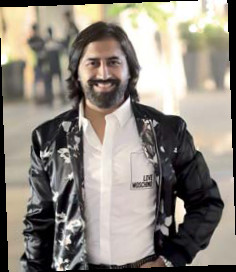
Dinesh Arora’s ambition for food took time to enter his soul. He grew up in New Delhi and studied Commerce at the Delhi University and loves travelling and has built quite a refined palate of his own. His passion towards eclectic cuisines stemmed right from his first bite of ‘Paella’ in Spain, ‘Tom Yum’ in Thailand, ‘Crème Brulee’ in France, ‘Dimsums’ in Hongkong and from his numerous visits to fine dining restaurants in London and Dubai. He entered the restaurant business owing to his love of food. Interestingly Arora loves Bollywood as much as his food, hence he named the brand ‘Eastman Colour restaurants’.
Where do you see your sector in the next 10 years?
The food industry is enjoying one of its best eras currently. With a spike in the number of diners to evolving palates and culinary rich audience, the industry has a lot of scope for growth. With increasing spending capacity, there is scope for many more restaurants in our country. The next ten years for restaurants in India will be more concept diners, chef-driven restaurants, comforting casual places and cuisines from all over the world.
What are the Top 3 food innovations in your opinion?
Chef-driven menus paired with alcohol has been an interesting innovation in the industry. Another innovation has been bringing back the traditional styles of cooking using organic and seasonal produce. Another innovation can be of fusion style of cooking that is a perfected marriage of two different cuisines into one.
How important is O2O synergy in your opinion?
The most effective and useful strategy, O2O is the best way for the food industry. From using online applications, aggregator websites and social media channels like Facebook and Instagram to capture epicureans and creating a brand presence to converting them offline by bringing them to the tables, the synergy between online to offline is vital for sales and growth of a restaurant.
What technological/innovative in-store & online experiences have you introduced to your brand?
Some of the technological innovations which we have implemented are online reviewing, location filters and geo-tagging. From sending informative mailers and SMS’s to birthday and anniversary discounts and wishes, we indulge in everything that enhances customer experiences. From offline customer feedbacks to engaging events at cafes, special discounts, themed nights, we continue to give multiple reasons for our patrons to come back enjoy.
Does your brand have an Omnichannel/Phy-gital strategy?
From an Omnichannel strategy that comprises of multi-channels of marketing to a phy-gital strategy that is a combination of the physical and digital, use of both is a plus point for all restaurants. Our marketing mix is headed by both these strategies thereby integrating the online mediums for presence and in-house presence. From running online campaigns, contests, videos, reviews etc. to collating offline activities, we as a brand are a mix of both.
What are the future plans for your brand?
We are in an expansion mode right now. From opening Swad in Gurugram to opening Unplugged Courtyard franchises, we are bringing in new concepts and menus every quarter.
4. ANCHIT NAYAR, CEO-RETAIL, NYKAA
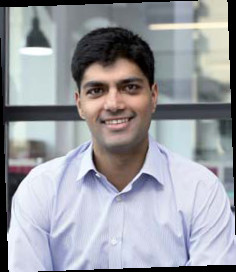
After seven years in investment banking at Morgan Stanley in New York, Anchit Nayar joined Nykaa in 2018 to look after the physical retail business. Due to his vision, Nykaa has successfully expanded its footprint to 45 stores, with a goal to hit 150+ stores within the next 3-4 years.
Where do you see your sector in the next 10 years?
The beauty and cosmetics market should double in size as consumer awareness is growing at a rapid rate and brand proliferation is increasing with the help of interactive communication platforms such as digital marketing. However, the physical retail component will surely remain important in this sector due to the touch and feel the nature of the category.
How important is O2O synergy in your opinion? Does your brand have an Omnichannel/ Phygital strategy?
If yes elaborate Nykaa’s unique journey began online and moved offline. Offline is critical to this category due to the personalisation element and the importance of experiential retail. The two work best in tandem to create a better shopping experience.
What technological/ innovative in-store & online experiences have you introduced to your brand?
Staff product training, knowledge through learnings and development apps, endless aisle ordering through handheld devices, queue busting, etc. are soon to be implemented. Beacon tech, 360-degree CRM, as well as app notifications, are already in process. AI and VR technology is also being examined for skincare and cosmetics. We have a couple of things in the pipeline as well.
What are the future plans for your brand?
We are focused on growing our footprint further pan India and becoming the biggest offline beauty retailer to complement our leadership position in the online space. We will continue to grow by educating the Indian consumer about beauty and bringing Nykaa into every neighbourhood.
5. HETAL KOTAK, CEO, LEE COOPER
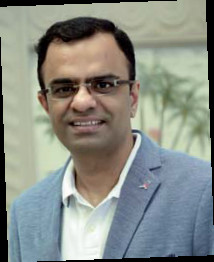
Hetal Kotak is a textile engineer with over 22 years of hands-on exposure to the varied nuances of Lifestyle Retail in India. Being hailed as a transformational leader, he has given quintessential importance to constant innovation and also towards constructing an approach for consumer delight at the forefront of all business endeavours. He joined Future Group as the CEO for two of the key strategic brands; Lee Cooper & ALL in February 2016. Prior to this, Kotak has worked as the Brand Director and Chief Operating Officer for Color Plus and Park Avenue at Raymond Ltd as well.
Where do you see your sector in the next 10 years?
The casual wear category has been growing at 15 percent annually for the last five years and is expected to be worth Rs 54,600 crore by 2023. I see ‘Fluidity’ as being the strongest watermark of success, in the near future for our industry. Fluid fashion can be occasion fluid, age fluid, etc. and in my opinion, it will continue to emerge as an even stronger consumer trend in the days to come. Our aim is to leverage the well-balanced portfolio of our lines and thereby emerge as an effective enabler of expressions, for our consumers. I see this sector growing at roughly 15 percent every year with ‘Denim’ witnessing one of the fastest growing rates in the apparel segment.
What are the Top 3 retail innovations in your opinion?
For me, shopping with Augmented Reality, Visual Search and Drone Delivery are some retail innovations that have made a major difference.
How important is O2O synergy in your opinion?
O2O is a medium of accessibility for today’s consumer. Our brand motto is being ‘consumer fi rst’ and if we feel O2O is a natural extension of making the shopping experience for the consumer more seamless, we will keep looking at it with the importance that it deserves. We hope and strive to give our consumers a far-fetched experience to make them happy.
Is sustainability something you and your brand are actively working towards? Tell us in detail.
Every season Lee Cooper aims to get better and outdo itself. In the bid to be a responsible, environment friendly brand with a legacy of over 110 years, we have adopted ‘e-fl ow washing technology, G2 Cube Technology, Laser technology and Indigo Dyeing. the following innovations’:
What are the future plans for your brand?
Lee Cooper is one of the biggest players in the casualwear space in India. From a brand that continues to have a very strong presence across SIS, we have forayed into opening several Exclusive Business outlets, in the last 1 year.
A successful run of these stores has resulted in our decision to open 20 new stores in the next year. The CAGR for 2016 to 2019 was around 25 percent per annum, and we are looking at growing by approximately 40 percent from 2019 to 2021.
6. INDRANATH SENGUPTA, CO-FOUNDER, KOMPANERO

Indranath Sengupta, started Kompanero in 2014, and has scaled it into a homegrown international brand with 27 stores across the length and breadth of India with a strong presence in the international markets. An engineer by degree, hailing from a business family, Sengupta held a deep interest in entrepreneurship right from a tender age. He has always been highly passionate about business and brand building. It is from this city Kolkata, that he has successfully set-up Kompanero across various countries. Currently, the brand is available in more than 400 stores in Australia and spreading its presence in USA, Canada and various parts of Europe.
Where do you see your sector in the next 10 years?
The demand for bags and luggage is highly correlated with the growth of travel and tourism in the country. Bags and luggage form a vital part of travelling, and hence, boost in travel will aid the growth in sales of bags and luggage. Bags dominate overall luggage industry, supported by the strong performance from backpacks and handbags, where value sales of bags doubled and will increase progressively in the future. The market in India is still in the nascent stage. With the per capita income and spending power increasing, the usage of premium leather bags and accessories is going to increase exponentially.
What are the top 3 retail innovations in your opinion?
Ultimate customization of goods at the point of purchase is something that is getting big, and with 3D printing advancing fast it’s only going to get bigger Omnichannel retail No Checkout shopping innovated by Amazon Go is another innovation that can shape the future of retail
Does your brand have an Omnichannel/Phy-gital strategy?
If yes, elaborate. By far offline stands tall in contributing majorly to the brand’s revenue, but at the same time we are keeping our pace up with today’s world by focusing on our e-commerce channels as well. To achieve the vision of the brand, it is important that both the channels go hand in hand. We are proud to say that we are achieving various milestones by opening more brick and mortar stores, and we plan to have an online shopping experience within the stores by next year. Due to limited space in the stores, it becomes difficult to exhibit the entire range of our products to the customers. In this case, our online platform would help our customers to have an enhanced shopping experience by giving access to a wider range of products and help them make decisions for purchase.
7. JAVIER SOTOMAYOR, MANAGING DIRECTOR, CINEPOLIS ASIA AND MIDDLE EAST
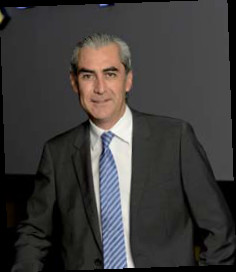
Javier Sotomayor has been with Cinépolis for 16 years during which he has held various leadership roles globally across marketing, business development and supply chain. He started his career at the Mexico headquarters started with spearheading the company’s fi rst international expansion to Central America in 2002. Since then, he has worked across various locations including Mexico, Central America, the Middle East, Indonesia and India. He has been an initial team member of Cinépolis India, since the brand entered the Indian market.
Where do you see your sector in the next 10 years?
2018 was a record year for the industry with Global Box Office revenues of $41+ billion. The Indian market also did exceptionally well to clock revenues of approximately$2 billion. Going forward, there is tremendous potential in the India market due to two reasons:
Low penetration of multiplex screens in the market: The overall screen density in India is very low – 8 screens per million people. Compare this to USA which has 125 screens per million people and the difference is clear. Even out of this low count of screens in India, only about 30 percent are multiplex screens. The rest are single screens. As consumers become more aspirational, they continue to demand better experience which multiplexes provide and so the numbers are bound to go up.
High appetite for content: India produces the highest number of films in the world – 2000 were produced in 2018, compared to around 800 in the US. Also, contrary to popular perception, the introduction of OTT platforms in the country has augmented this demand.
What technological/ innovative experiences have you introduced?
Globally, we were the first to introduce the recliner concept in the exhibition industry through the sub-brand Cinépolis VIP. In terms of projection and sound we have the best the industry has to offer – i.e. the Series 60L Laser Projector and Dolby Sound Certification for our cinemas. We have always offered the best technology formats in our theatres, starting with the first 4DX screen in the country. Thereafter, we have introduced many more concepts such as IMAX, Onyx 4K and Cinépolis Junior. Apart from this, Cinépolis is also the only exhibitor in the country to offer RealD 3D, a leading global cinema 3D technology.
Recognising the fact that food is an important element in the movie going experience, we launched our biggest F&B campaign, as we collaborated with the acclaimed chef Saransh Goila to develop and launch an all new menu with over 100 dishes across India.
What is the future-plans for your brand?
Globally, Cinépolis is present in 17 countries including USA, Europe, Latin America, South Asia and most recently, the Middle East and Indonesia. In Middle East, Cinepolis has plans to expand in UAE, Oman, Bahrain and Saudi Arabia. In line with its plans to expand Cinépolis’ global network, Cinépolis has entered into a strategic partnership with Lippo Group, Indonesia’s leading consumer services group, and its subsidiary PT Cinemaxx Global Pasifi k (“Cinemaxx”). Talking specifically about India, we are extremely proud of our journey and achievement in our decade long operations here.
8. MANISH AGARWAL, CEO – EAST, FUTURE RETAIL
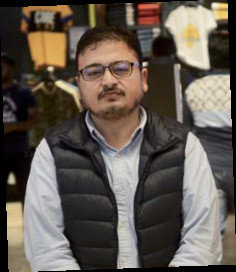
A Chartered Accountant by profession, Manish Agarwal has been working with Future Group since 1997. Under his leadership, the brand has grown and established itself as a household name in the eastern region.
Is O2O synergy important for your business?
We have an excellent Online to Offline presence. We are active in engaging with customers online to get them to come and shop in our physical stores. This is important part of our customer engagement strategy.
Does your brand have an Omnichannel/ Phygital strategy? If yes elaborate.
Retail 3.0 strategy of Future Group is all about ‘High Touch + High Tech’ which is blended form of e-commerce with layering technology having it delivered in the physical space for the consumers.We also have a small format business ‘Easyday Club’, which runs on a membership model where members can place orders online, pay digitally and get products delivered at their doorstep.
9. JP SHUKLA, CO- FOUNDER & CEO, 1-INDIA FAMILY MART
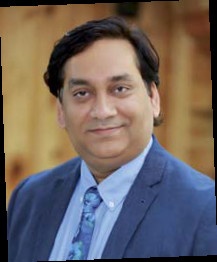
Jay Prakash Shukla or JP, as he is popularly called, is a force to reckon with in the retail industry in India. In a distinguished career spanning over 17 years into retail with companies like Vishal Retail, Big Bazar, Salasar Retail Adani Retail and Indiabulls Retail, JP Shukla held key leadership roles, including Whole Time Director and CEO for Vishal Retail as last assignment before starting own venture. Under his leadership, these businesses have set the retail industry performance benchmarks. In over two decades, JP has straddled the entire gamut of modern retail; his expertise ranges from merchandising, value retail, buying and sourcing, strategy and vendor selection. He founded 1-India Family Mart with the objective to be the ‘bell-bearer company’ in the value retail space.
Where do you see your sector in the next 10 years?
In coming ten years, the retail industry is expected to grow with an immense pace, on grounds on technology, innovation and digitalisation. We will be seeing a much more advance level of convenient and seamless experience across all platforms. As far as 1- India Family Mart is considered, we aim to reach to an overall turnover of Rs 5000 crore, covering almost all the major states and catering the demands and needs of 75 percent of the overall population.
Does your brand have an Omnichannel/ Phy-gital strategy?
Currently, we are in the process of piloting an Omnichannel approach and once we get the desired results, we will probably launch a full bloom setup in an advanced manner.
What are the Top 3 retail innovations in your opinion?
In my opinion, the top three innovations in the retail industry so far have been IoT, Big Data and CRM analytics.
How important is O2O synergy in your opinion?
To be successful in the time of cutting-edge competition, we need to understand the importance of an O2O setup. We have to be open for all kinds of business expansion model and this O2O synergy is currently our top priority.
Is sustainability something you and your brand are actively working towards?
The business has to be sustainable in order to envisage growth. If the front-end expansion is not backed up by technology and new innovations at the back end, we will probably not be able to sustain the business model or growth.
What technological/ innovative instore and online experiences have you introduced?
We have an AI-based monitoring system at our stores where we try to ascertain the customer demographics through these cameras and build insights.
How has the company grown under your leadership?
I have been heading this business for the past 7 years now. We are about to reach the store count of 100 stores. The journey so far has been very successful as we have moved on with a planned approach, supported by a dedicated team.
10. MAYANK LAKHANI, MANAGING DIRECTOR, LAKHANI INFINITY FOOTCARE PRIVATE LIMITED
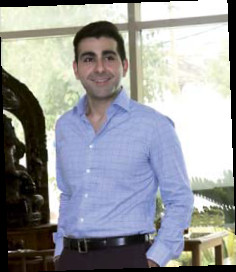
After completing his Masters degree from Boston University, Mayank Lakhani started Lakhani Infinity Footcare Private Limited with a team of only 20 people in Sahibabad with a core focus to stay relevant to the youth with their products. Under his leadership, the company achieved an annual turnover of Rs 10 crore in its inaugural year itself. Later, in the year 2016, the brand reached crossed the mark of Rs 50 crore and in 2019 the brand has already achieved a total turnover of Rs 105 crore. The target for 2020 is to achieve a turnover of Rs 200 crore and grow to a team of 60 people.
Where do you see your sector in the next 10 years?
Business visionaries in India are reforming the footwear business in the country, which is currently dominated by men’s footwear, which contributes close to 58 percent of the total Indian footwear retail market and is expected grow at a CAGR of 10 percent by 2020. According to a recent Indian footwear industry report, footwear production is over 22 billion pairs annually, accounting for approximately 9.6 percent of the total global footwear output per year.
What are the Top 3 retail innovations in your opinion?
The three top retail innovations as per me are: 3 D printing, AR and Data collection
How important is O2O synergy in your opinion?
Online-to-Offline is the way to progress for most players who need to draw in their client base in India for the long haul. We are also working on our O2O strategy as it is important for a brand in the current age and time to be present at a spot where your customers will need you to be.
What are the future plans for your brand?
The company aims to introduce many innovative products with the underlining principle of comfort and modernity. This will, in turn, facilitate better customer care through innovation in line with our philosophy of dynamic development. I always work with the belief that if quality footwear at reasonable prices can be made available to customers, then we can be at par with any foreign footwear brand. Major plans for the brand consist of:
1. Introducing a kids’ segment, a first for Lakhani
2. Boosting online sales through radio campaigns
3. TVCs on major national channels by October, 2020
11. KARAN TANNA, FOUNDER, YELLOW TIE HOSPITALITY
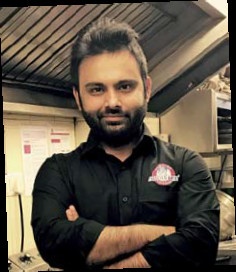
An automobile engineer from Sardar Patel University, Karan Tanna has an experience of working with General Motors and McKinsey & Company in the past. He opened a restaurant Chain named ‘Kutchi King’ as his first project. In 2015, he started Yellow Tie Hospitality and aims to expand the brand to a few hundred stores pan India.
Where do you see your sector in the next 10 years?
The F&B industry in India is one of the most booming industry in the last few decades. New-age business like food tech, deliveries, home dining is growing big time and has given conventional businesses a run for its money. At the same time, experiential restaurants are growing to another level of orbit. Food malls are growing. It’s a crazy time and customer is in the best seat right now.
The coming 10 years are going to challenge conventional business practices and will bring the best out of restaurateurs. The industry will evolve and mature. Eating out is increasing day by day and in the next 10 years, the industry will grow at least 3 folds.
What are the Top 3 retail innovations in your opinion?
In food retail, I would say that drive-through is a big innovation. The use of technology has enabled a lot of innovations. Booking your meal and taking it away from a counter at a QSR joint is a very cool innovation. Companies like Eat and Pret have developed great Logistics to freshly prepare the food in-store to be sold on their cold/hot retail shelves.
Does your brand have an Omnichannel/ Phy-gital strategy?
If yes elaborate We serve food in our stores as well as on delivery aggregators. We also serve food through our own platforms but however, due to the dominance of delivery aggregators, it is usually through them.
What technological/ innovative in-store & online experiences have you introduced to your brand?
We have shifted to Digital Menus in most of our stores. We are also doing a pilot of virtual reality product showcase. This is very exciting and takes the ordering experience to another level. We have also started to leverage targeted social media marketing to only our users, categorised with their behaviour. This has started to give us a good return on the marketing dollar.
AI-enabled audit technology is very handy to track what’s happening at our stores.
Technology and innovation have become a way of life for customer experience and restaurant operations.
Is sustainability something you and your brand are actively working towards? Tell us in detail.
In one of our brands, we use only biodegradable disposables. This prevents a lot of pollution and wastage. We advocate sustainability discipline to avoid food wastage and control environmental pollution.
12. PANKAJ VERMANI, FOUNDER AND CEO, CLOVIA
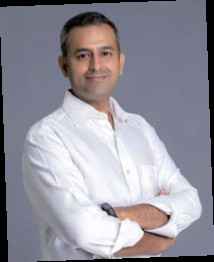
Pankaj Vermani’s first job was that of a regular software engineer in Global Logic, where he worked for around 1.5 years. He set up his first company with a bunch of friends which was acquired by Tribal Fusion Inc, a California based company, which was then the fourth largest Ad Network in the world. He started the India office of Tribal Fusion with a few co-founders. Post that, he ventured into Vriti, an eLearning company. Prior to starting Clovia in 2012 and exiting Vriti, he set-up and headed an incubator for a Swiss fund in India for a short period.
Where do you see your sector in the next 10 years?
Lingerie for the longest time was a staple product with hardly any innovation. The last few years have seen unprecedented growth in awareness – both from sizing/hygiene as well as fashion perspective. While the overall apparel category is growing at 8-9 percent CAGR, lingerie is pegged to grow anywhere between 15-22 percent annually.
The currently $4 billion market (and 8 billion by 2020) is still so nascent that the top 10 brands put together are not even addressing 8 percent of the overall market. Innerwear shopping online is estimated to be growing at 50-65 percent annually. The lingerie market has just started to scratch the surface and is all set to bloom in the coming years.
What are the Top 3 retail innovations in your opinion?
The gradual shift or acceptance of digital is one of the biggest innovations. Another aspect that is picking up fast in the retail industry is product creation based on feedback or customized products.
What are the future plans for your brand? How has the company grown under your leadership?
Clovia is now the fastest growing brand in a 4 billion market where the top 10 players hold less than 8 percent of the market. While Clovia continues to grow in the online space, we’re fast setting footprint in the offline retail as well, to ensure a pan India brand presence in all genres of our customer base. The idea is to continue the growth, accelerate both our online and offline channels with equal push. In the next 5 years, Clovia intends to be the largest lingerie brand in India. While we are steadily on that path, we’re also encountering a host of organic/inorganic opportunities to grow internationally, which we are exploring, and the next 4-5 years will also see Clovia’s presence in at least 4 more geographies. And in this journey – both online and offline will work towards providing wholesome customer experience and thereby remain equally important for the brand. We are now selling 600,000 pieces a month i.e approximately 1 piece every 5 seconds.
13. KAZEM SAMANDARI, FOUNDER, L’OPERA

Kazem Samandari is a trained engineer from the Swiss Federal Institute of Technology with a Ph.D. degree in Industrial Economy. He started his professional career as an assistant, teaching at the university followed by a very rich trajectory which took him to 64 countries, from design and planning of nuclear power plants to social and economic development, digital printing, high-tech medical devices to finally the Food & Beverage sector in India.
What are the top 3 foodservice innovations in your opinion?
According to me, the top 3 innovations in the food segment include replacing quantity with quality; gradual move away from meat; growing importance of healthy nutrition.
Where do you see your sector in the next 10 years?
In ten years, I see the food industry becoming more and more important both in terms of ‘feeding’ people and playing a growing social role as a means of connecting individuals and families who engage in a collective experience.
How important is O2O synergy in your opinion?
O2O or clicks-to-bricks as some like to call it is certainly going to play an increasing and important role in the F&B space worldwide. The synergies are undeniable as are the challenges in our particular segment, but there are still a lot of challenges.
What technological/innovative in-store & online experiences have you introduced to your brand?
We started working with the implementation of a very robust and integrated ERP system, which is now working quite well both at the back end in the production centre of L’Opéra and in its outlets. We have also created an excellent data base of over 40,000 customers who have engaged in a documented interaction with our brand. We are currently in the process of evaluating and implementing new technologies at the store level and additional proposals for online use to enhance the customer experience with L’Opéra.
Is sustainability something you and your brand are actively working towards?
Absolutely. Responsible and sustainable growth is one of the 8 core values of L’Opéra which also includes such elements as commitment to excellence and quality, collaboration and mutual respect, gender equality, honesty and transparency, meritocracy and equal opportunity, courtesy and ownership and accountability. At L’Opéra, we wanted to create a brand and activity which would last for generations.
This fundamental “sustainability” required a profound and honest relationship with all stakeholders, namely the staff, the customers and the shareholders but also with the society and with the environment.
What are the future plans for your brand?
Now that we have established our brand and secured a solid reputation as the foremost authentic French pâtisserie, bakery and Salon de Thé (Tea House) in Delhi NCR, we have embarked upon an ambitious but realistic expansion plan which will take us to some 23 outlets in Delhi NCR, Mumbai and Chennai by 2019. We expect to operate some 50 outlets pan-India within the next 5 years.
14. RAHUL VIRA, CEO, SKECHERS SOUTH ASIA PRIVATE LIMITED
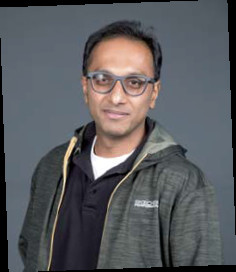
Rahul Vira is the CEO of Skechers South Asia since April 2015. He has 18 years of experience working with highpaced organisations across Lifestyle, Luxury and Online industry in India and the Middle East. Vira started his career with India’s leading retail chain working across various functions of buying and merchandising, marketing and operations. He has also worked in the Middle East with an American chain. During the fi rst round of Internet action globally, Vira joined India’s leading media house in their Internet division setting up e-commerce. This was one of the leading few online shopping activities in India. He further moved to work with leading jewellery brand of India in the leadership role.
Where do you see your sector in the next 10 years?
The coming ten years for the Leather and Shoe industry are going to be very innovative and exciting. They are going to be very impactful for the retail industry. Footwear industry will be one of the leaders in the retail industry with a variety of innovative range.
Does your brand have an Omnichannel/Phy-gital strategy?
As far as our Omnichannel/ Phy-gital strategy is concerned, Skechers is currently working towards implementing in-store devices to further enhance shopping experience.
What are the future plans for your brand? How has the company grown under your leadership?
India is one of the fastest-growing markets globally for sportswear. We are just beginning the journey here and are very young in this market. In the next few years, we will expand 360 degrees and enter Tier-III and Tier-IV towns. We are also testing apparel and will launch athleisure wear this year. As far as e-commerce is considered, we are taking it slow at this moment. However, we will be innovating and upgrading our own website to improve customer experience and feel.
15. MITHUN APPAIAH, CEO- INNOVATIVE FOODS LIMITED, SUMERU
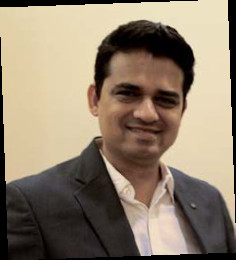
With around 16 years of experience in the FMCG space, Mithun Appaiah’s expertise lies across the spectrum of sales, marketing, R&D, key account management, customer marketing, business development, P&L management and start-up accelerator. He started his career with Nestle India. He has also worked with Britannia as National Channel Development Manager and Customer Marketing Head for channels and Modern trade business. Currently, he is leading Innovative Foods Limited (IFL) makers of the brand Sumeru as the Chief Executive Officer.
Where do you see your sector in the next 10 years?
The frozen food sector is increasing its visibility gradually since frozen is the way forward in the next few years. The demand for frozen food is increasing year-on-year because of convenience and more shelf life as they can be stored, consequently leading to zero food wastage. The processed and frozen food market has been witnessing steady growth both in India and the world over, particularly in the developing Asian countries. India’s frozen food market which stood at US $310 million in 2017 is projected to grow at a CAGR of over 16 percent to reach US $754 million by 2023. Today, frozen food is more accessible to the Indian consumer because of the increase in the number of large format retail stores in the country. Smaller retail stores too now have better refrigeration facilities.
What are the Top 3 retail innovations in your opinion?
The top three retail innovations are: Enhanced customer experience during payments, Augmented Reality and Direct-to- Home service.
What technological / innovative in-store & online experiences have you introduced to your brand?
We use real time systems with temperature tracking enabled network that help us monitor and take decisions immediately.
Our vehicles are GPS enabled and have temperature monitoring set up which allows us to ensure that there is no deviation on this front. We are looking ahead and see frozen as the new future. We want to keep delivering an exciting range of frozen product. In fact, we are the first retail company to launch a Michelin Chef range as a frozen product and also, we have added Momos (Veg & Non -Veg) as a part of our new addition.
What are the future plans for your brand?
We have renovated ourselves as a young, agile and disruptive brand. Food is the most exciting category today. We want to reposition ourselves as a complete foods company. We will focus on new trends, large categories which need disruption as well as look at categories which solve issues for the consumer.
Sumeru for the first time in the last decade has seen a growth of 25-30 percent with reduced spends and with one of the largest numbers of new innovations.
Our domestic retail business has nearly doubled its reach. Exports have grown at 40 percent with the introduction of our new range and with our entry into the Middle East. We have got into categories which are exciting and break the mytharound frozen. Many fi rst-time innovations in product, process and concepts have also been executed.
16. RAJNISH SETHIA DIRECTOR, SUCCESS

Rajnish Sethia started working in the textile industry from the age of 16 and gained experience and then went on eventually to establish his own brand under the name ‘Success’. He started from scratch by manufacturing trousers and went on to build a team with the vision of having a brand with the entire menswear range. Sethia believes in hard work and focusing on the goals that have made him reach a successful point of his professional journey.
Where do you see your sector in the next 10 years?
The menswear apparel sector is unique and variant. Everyday there is a new addition to the trend and style and there are some trends which are always in fashion. I believe, this sector will reach newer horizons with the advent of latest technologies in the coming years.
What are the top 3 retail innovations in your opinion?
The top three retail innovations are, Physical stores for digitally native brands, Adding Omnichannel experiences across all platforms and Product customisation.
How important is O2O synergy in your opinion?
Although e-commerce with digital outlook is here to stay, physical retail stores will thrive too. The key is to intertwine online business with the offline world. So, offline to online (O2O) synergy, the next frontier for retail is here to stay and is also very important.
Is sustainability something you and your brand are actively working towards? Tell us in detail.
We as a brand are doing our bit for sustainability. Earlier 50 percent of our entire shirt production used to go through various chemical processes to get its fi nal look but now we have reduced it to almost 15 percent thereby reducing water and chemical use which is environment friendly. We are now buying high-end fabrics for shirts which do not require chemical processes. In case of denim also we are moving towards basic washes which require lesser water and chemical wastage. Thus, we are trying our bit to make environment-friendly garments.
What are the future plans for your brand?
We are planning to grow our brand pan India. We want to enter Tier II & III cities focusing on the entire menswear range. The journey from 1996 to 2019 has been good, with ups and downs and a lot of learning curves.
17. NARINDER SINGH DHINGRA, CHAIRMAN AND MANAGING DIRECTOR, NUMERO UNO CLOTHING LTD
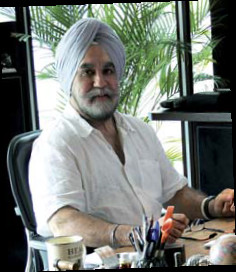
Narinder Singh Dhingra has been as the Chairman and Managing Director of Numero Uno Clothing Ltd. since December 14, 2006. He possesses an in-depth experience of over two decades in the apparel segment with a comprehensive understanding of the Indian retail landscape. He incepted the Numero Uno brand in the year 1987 with his astute vision of growth and expansion, which has now transformed into a dynamic unisex casual wear brand. Dhingra has been awarded with the Gem of India Award, as well as the Hind Ratna Award. Prior to focusing on Numero Uno Clothing Ltd., Dhingra was associated with Lee Cooper and was instrumental in introducing and establishing the brand in India.
What are the Top 3 retail innovations in your opinion?
The top three retail innovations are: Personalised targeted (location-based) marketing, Click & Shop model and Digital Payments
How important is O2O synergy in your opinion?
O2O synergy is the best way to ensure a brand is able to fulfill the order and doesn’t lose out on business due to unavailability of the product in a particular store, be it online or offline. As long as the brand has the product available in its universe, it should be in a state to deliver it to the customer.
Is sustainability something you and your brand are actively working towards? Tell us in detail.
For Numero Uno sustainability is not just about making a contained range and labeling it as conscious/sustainable. It is about inciting a real change at every stage of the product lifecycle possible, from manufacturing to washing & finishing, to delivery, to recycling and disposal.
Numero Uno has taken real and significant steps towards setting up an ethical and sustainable ecosystem from the beginning, adopting eco-friendly processes and technology with emphasis on low water consumption, restricted use of hazardous chemicals and good working conditions for its workforce. There has been a conscious, gradual and consistent shift towards sustainable methods, adoption of effective technology like extensive use of laser machines instead of hand-scraping for benefit of workers’ health. The use of ‘E-Soft, Ozone/G2, Cold-Eco Dyeing’ has helped in reducing water and hazardous chemical consumption.
In 2017, NU collaborated with Jeanologia of Spain and created a sustainable collection of denim called ‘One Glass Water Denims’ wherein only one glass of water is consumed during the washing/ finishing process.
What are the future plans for your brand? How has the company grown under your leadership?
We are in process of establishing a user-friendly website, which will be a convenient platform to purchase our clothes, shoes and accessories. An exclusive range for the website is also part of the plan. We have come a long way from a website which was just for information about the brand to know where our products are being sold and generating interest among online shoppers. We will expand our offerings to cater to our audience at a price that would be exciting for them to make a purchase.
18. RICHA KALRA, FOUNDER, CANDYSKIN

Richa Kalra has been working since the tender age of 16, during her undergrad times from European University Barcelona in Business Administration. Post that, she completed her post-graduation from Istituto Marangoni London in Fashion Brand Management. She interned with a jewellery brand called Maria Francesca Pepe in London right after her education. On returning to India, she started working in the Sales & Marketing Department in her father’s company. After gaining experience, she started working on Candyskin along with her sister.
Where do you see your sector in the next 10 years?
There’s a lot of scope in the lingerie market, as most of it is unorganised (especially in India). I hope that in the next 10 years the market will get converted to the organised sector.
What are the top 3 retail innovations in your opinion?
The top retail innovations as per me are: Omnichannel experiences Product Customisation Innovative POS, CRM System and Digital VM
Does your brand have an Omnichannel/ Phy-gital strategy?
Yes, we do different types of marketing activities to increase customer engagement, for example, print ads, pamphlets, discount coupon distribution at events / corporate / restaurants, Quiz, SMS Campaign, Fit Sessions, follow-ups for customer feedback and after-sales services.
What technological/ innovative in-store & online experiences have you introduced to your brand?
We have a tab called ‘Find Your Size’ on our website, wherein the customer is asked 4-5 questions to fi nd out their correct bra size in case they are not sure about it, as sometimes the customer also does not know their correct size. We also have a chat service to help the customer shop online as and when they require. Alternatively, they can reach out to us on Whatsapp by clicking just one button.
Is sustainability something you and your brand are actively working towards?
We have moved to biodegradable plastic from regular plastic and are trying to convert to biodegradable and recycled packaging.
What are the future plans for your brand?
We are constantly expanding to different markets/states in India. We are also constantly working on expanding our product range.
19. PUSHKARAJ SHENAI, CEO, LAKMÉ LEVER
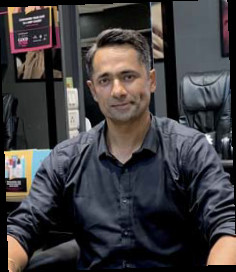
Pushkaraj Shenai is the CEO, Lakmé Lever, the beauty services business of Unilever which operates over 435 salons in over 65 cities in India. He has over 20 years of experience in strategy, operations, marketing and sales across consumer goods, retail and real estate. Prior to Lakmé Lever, Shenai was COO, Piramal Realty where he built the team responsible for land acquisition, project management, marketing and sales for a portfolio of 18 million sq. ft. He has also led the team at Globus which won the Best Fashion Marketing award at IMAGES 2008. Shenai has worked across sales and marketing in Unilever working across regional and global brands in skin care and cleansing.
Where do you see your sector in the next 10 years?
The outlook seems exceptionally bright due to the constant innovation and new launches which are catering to consumers’ growing requirements and will fuel growth in the industry. Consumers now are more inclined towards experimenting with their looks and utilise each service available at their disposal. We continue to expect a strong growth in the salon services industry led by increased consumer demand and premiumisation.
What are the Top 3 retail/brand innovations in your opinion?
For me, the top retail innovations are Augmented Retail, customisation and store as a content/entertainment hub.
How important is O2O synergy in your opinion?
The Lakmé Salon app – allows flexibility to the consumers to seek interesting beauty content, browse the portfolio, book appointments, review and redeem Runway Rewards points. It is very encouraging to see an early response.
What technological/innovative in-store & online experiences have you introduced to your brand?
At Lakmé Salon we believe in giving the best and for this, we have introduced: Lakmé Salon App: The app comes ready with the catalogue of services and treatments that we offer, making it easy for the customers to book directly from their mobile devices. This app is the perfect way to stay connected, manage bookings, and provide all the latest news and special deals Diagnostic Tools: Introduced skin analysers and face mapping techniques and tools which enable experts to understand the consumers’ needs better and in return suggest them the treatment suitable for them
What are the future plans for your brand?
We have a strong and talented leadership team inspired by our vision to ‘Beautify the Future’. This team works relentlessly towards fulfilling and preserving our six core values – People First, Customer Obsession, Beauty Rules, Owner’s Mindset, Keep it Simple and One Step Higher. With this passion, we have been able to create value for the company as well as our stakeholders. Over these last few years, we have made significant progress in our Net Promoter Score, service innovations and expansion agenda. We have been able to build a growing and profitable enterprise and I feel honoured that my role in the company enables me to contribute further to this vision and values.
20. RAGINI MEHRA, FOUNDER, BEAUTY SOURCE
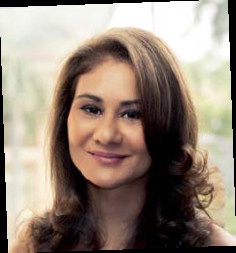
Ragini Mehra’s portfolio includes projects across the residential, hospitality and corporate sectors. Currently, she is the managing partner at Silhouette, the foremost luxury salon in India, and is founder of Silhouette Retail.
Where do you see your sector in the next 10 years?
As far as Beauty Source is concerned, we are planning to expand operations in 2019, with a focus on reaching out to more and more consumers across the country. We are partnering with several online and offline retailers to sell the products, as well as numerous spas and salons to use them in the treatments that have proven so popular over the last 18 months.
What are the Top 3 retail innovations in your opinion?
The three top retail innovations as per me are, ‘Merging of online, offline and mobile customer experiences, pop-up shops and social shopping.
How important is O2O synergy in your opinion?
O2O synergy is an important aspect to approach for brand value. At Silhouette Salon, one can step in anytime to experience the product/service, and if they like the product, they can easily get it with a click a button without going anywhere. Is sustainability something you and your brand are actively working towards? Tell us in detail.
Yes, we believe in sustainability. Like Sans[ceuticals] products use potent vitamin actives to repair, nourish and protect. These ingredients have been proven in rigorous scientific trials to change the appearance of skin and hair and assist in recovery from sun damage, pollution, and irritation. After exhaustive research and consultation with environmental scientists, Sans[ceuticals] chose PET for its packaging. This modern, safe and non-leaching form of plastic is the most stable packaging material available today. All Sans[ceuticals] bottles are solid in colour, ensuring the highly active ingredients are protected from UV light.
What are the future plans for your brand?
We are planning to expand operations in 2019, with a focus on reaching out to more and more consumers across the country. Beauty Source is partnering with several online and offline retailers to sell the products, as well as numerous spas and salons to use them in the treatments. We are also expanding the product range, with some very exciting new launches and brands to introduce.
21. RAHUL AGARWAL, CEO & FOUNDER, ORGANIC HARVEST
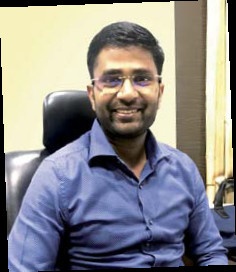
Rahul Agarwal started his career as a Chartered Accountant but his search for innovation and doing something disruptive made him an entrepreneur. With determination to develop a good quality product with reasonable pricing for conscious consumers, he along with his team conducted a research about the beauty market in India and abroad. The limited availability of pure and organic personal care products in the country fi nally led to the conception of ‘Organic Harvest’. Presently, he aims to make ‘Organic Harvest’ a ‘go-to-brand’ in the personal care segment in India in the coming two years.
Where do you see your sector in the next 10 years?
In the coming 10 years, the organic personal care sector will grow exponentially, attributing to factors like expanding urban population base, rising health concerns, growing consumer spending on lifestyle and personal care, etc. Changing consumer perception towards the choice of products coupled with the growing utilisation of environmentally sustainable products has fueled and will continue to cause the much visible growth in the organic personal care industry.
What are the Top 3 retail innovations in your opinion?
AR, AI and Omnichannel are the innovations that have made a huge impact on the retail industry.
How important is O2O synergy in your opinion?
O2O – is on the rise in India. Marketers, these days, are leveraging both online and offline channels to create new customer touchpoints. At Organic Harvest, our presence at online e-commerce platforms and on social media platforms blends well with offline interactive communication strategy.
Does your brand have an Omnichannel/ Phygital strategy?
At Organic Harvest, we have opted for a similar Omnichannel strategy in order to be able to infl uence our consumers through various platforms. Social media is one of the key legs of our marketing strategy. Instagram and Facebook work great for a brand like us, we have increased our followers by 5x over last year and so has the engagement improved.
We are also regularly curating engaging video content for YouTube and offering industry insights and company news through LinkedIn and Twitter. We have Organic Harvest products available in more than 20,000 brand outlets across Tier I & II cities. We have appointed more than 500 Beauty Advisors in stores with the maximum consumer footfall to provide the consumers with open channels of conversing with the brand.
What are the future plans for your brand?
Organic Harvest has been growing aggressively. When we started, we had 30 outlets and today we have presence in 6,000 outlets in the country. With more than 30 percent growth in terms of revenue and presence from 3500 to 6000 outlets (2017- 2018), we are expanding at a thrilling pace. We are expanding globally as well. We have debuted in the UAE market. Organic Harvest is already present in US, KSA, and Nepal with its extensive range of organic personal care products. Moving on, the company plans to take a 360-degree route to take the brand to another level and reach out to every individual that consumes personal-care products and make organic a lifestyle.
22. RAJESH JAIN, MANAGING DIRECTOR & CEO, LACOSTE INDIA

Rajesh Jain’s signature quote sums up his approach to business leadership succinctly and emphatically – ‘Top Line, Bottom Line, Growth, Customer Delight and Human Resource Development, everything else is merely incidental’. Jain’s clearly stated mission – growth as opposed to category leadership – has shaped Lacoste India into a lifestyle brand, which is very popular amongst Millennials. A Masters in Commerce from the University of Delhi and a CA from the Institute of Chartered Accountants of India, Jain obtained his CS degree from the Institute of Company Secretaries of India.
Where do you see your sector in the next 10 years?
Like other growing economies, India is experiencing major transformations in the retail sector. The market is maturing as most retailers are now focusing on profitable growth. In coming years, the advancement in mobile technologies, AI, VR and easy availability of the internet will give impetus to fast and smart retail. Things to watch out in future retail are Ultra-Fast Delivery, Digital Dressing Rooms and Curated Experiences and Robot Customer Service
What are top 3 retail innovations in your opinion?
The top three innovations for me are: Premium malls, Increased channel of distribution and Omnichannelisation.
How important is O2O synergy in your opinion?
Online to Offl ine (O2O) business can effectively provide a seamless experience to the customer whether the customer buys online or offline. It helps the customers to make purchases in the offline stores without any hurdle.
What technological/innovative in-store and online experiences have you introduced to your brand?
We have started a CRM platform which has proved to be very fruitful. Then, we use ERP and PoS systems which provide an effective solution to our supply chain needs and end-customer experience. We are also working towards innovation like how to map inventories to try and give our customers the best Omnichannel experience.
What are the future plans for your brand?
As far as expansion is concerned, we follow the “Selective Distribution Network” Policy across the globe. Each and every new point of sale is chosen very carefully, keeping the premium-ness of the brand in mind, hence we look for the premium environment, adjacencies, catchment, etc. Delhi and Mumbai being the most important markets in India, the brand has much deeper penetration in these markets and intends to expand further.
23. RAHUL KHANNA, DIRECTOR, AZURE HOSPITALITY
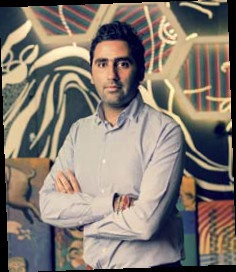
Known for his hard work, dedication and vision, Rahul Khanna believes in enjoying the idea of creating experiential brands that are lively and have people at the heart of the essence. A graduate in hospitality management from Ecole Hoteliere De Lausanne in Switzerland, Khanna started Mamagato with his friend Kabir in 2010. Today Azure Hospitality has a number of brands like Dhaba, Roll Mall, Speedy Chow, and boutique brands under Sly Storys with Sly Granny and Foxtrot.
Where do you see your sector in the next 10 years?
The next decade is vital for the growth of the food sector of our country. Our country is on the verge of a major expansion. With the increasing population and the rise in average diners eating out daily, the growth and scope of the sector is massive. From increasing disposal income to changing habits of Millennials and working professionals, the concept of comfortable and casual cafes and bars are up for exploration with a growing future for all-day diners.
What are the Top 3 food innovations in your opinion?
Baking is one of the most important innovations in the food industry. Another innovation is ‘mock or vegetarian meats’ which is done by specialised companies like Impossible Meats. Third is the usage of probiotics in form of drinks and food.
How important is O2O synergy in your opinion?
O2O strategy not only helps in bringing more business to the brand but also helps is creating an effective brand strategy. The synergy of both online and offline is important considering the digital era we are living in. Whereas, online helps in locating restaurants and their offerings with the help of social media, offline helps in converting customers and bringing them to the restaurant to experience the food and services offered.
What technological/innovative in-store & online experiences have you introduced to your brand?
Azure Hospitality offers a loyalty program for its customers with discounts and offers from time to time. From in-store database and feedback forms, our brand uses online channels to inform our guests about the upcoming events and offers via e-mails and SMS marketing. We also host online campaigns on social media to enhance their experience.
Is innovation and invention something you and your brand are actively working towards?
Innovation is an important aspect of our brand’s sustainability model. Our restaurants involve itself with many new offerings every year. With a menu with over 150 signature offerings, we make sure our customers never get bored with our food. From hosting musical nights to revamping the interiors and making changes in the menu, we believe in staying true to our brand by adding new innovations as per the comfort of our patrons. With more sustainable food menus to plush interiors, we are actively working towards building a better brand every day.
24. ROHIT NARANG, CO-FOUNDER, TOSSIN GOURMET PIZZAS
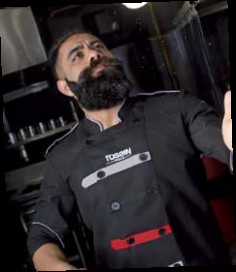
Rohit Narang’s journey led by the passion for food began many years before he started ‘Tossin Gourmet Pizzas’. He moved to Australia in order to pursue his passion professionally, studying for a hotel management degree. He opened a food truck after working with the best names in the Australian food industry. He returned to India and after doing a dedicated work for a year and half, he launched Tossin Gourmet Pizzas with Honey Mehta in 2013. Under his leadership, Tossin has won awards like “Half Pizza Marathon” and “Best Pizza in Gurgaon” and gained appreciation across food critics and restaurant industry gurus.
Where do you see your sector in the next 10 years?
Pizza is one of the world’s most consumed food items. Now given the fact that the Indian pizza market is still in its growing phases, 10 years from now it should at least be 3 times of what it is today What are the Top 3 food retail innovations in your opinion? The top 3 food retail innovations for me are AQS-system, Vertical farming and 3D Printing technology
Does your brand have an Omnichannel/ Phy-gital strategy?
We work with multiple partners for our phy-gital piece. The goal is to drive customers to our restaurants and enjoy the dining experience together with our food. We do multiple campaigns for this through our website and through multiple other online mediums that fetch us a great deal of customers.
Is sustainability something you and your brand are actively working towards?
India is a big country and to have adequate coverage we would need a significant amount of time for which we ought to be sustainable in our approach. This reflects in every aspect of business that we do mostly around the supply chain.
What are the future plans for your brand?
We have exciting times ahead of us as we would be growing significantly in the times to come. I came up with multiple strategies around formats of our outlet to successfully combat the expensive real estate which helped us win some marquee locations that are doing exceedingly well. We have won awards like ‘Half Pizza Marathon’ and ‘Best Pizza in Gurugram’. Recently, our digital campaigns have also won two advertising awards. We are always moving forward and wishing to do better every day.
25. MANISH BHARTIYA, DIRECTOR, RATNADEEP
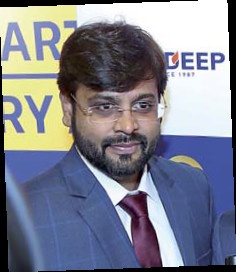
Manish Bhartiya took over his role in Ratnadeep, when his father Brijkishore Bhartiya retired due to health reasons. Bhartiya is a determined and dedicated individual with a vision for the brand. He believes in strong implementation and following up with chain of command. Bhartiya rates the brand’s 25th store opening celebration as one of the great achievements of his career and aims to take the brand to further heights.
Where do you see your sector in the next 10 years?
This industry is set to grow multi folds in the coming years. We see a lot of modern shoppers moving to this convenient format that we are in. People don’t want to waste time going to malls, spending time in parking, etc, but also don’t want to completely move to digital shopping as groceries have an aspect of touch and feel.
What are the Top 3 retail innovations in your opinion?
The top three retail innovations according to us are:
Hyperlocal platforms
Fresh foods / cafés in-store
Experience-based shopping intertwined with physical and digital strategies
Does your brand have an Omnichannel/ Phy-gital strategy?
If yes elaborate Currently, we are tied with hyperlocal platforms like Dunzo, Swiggy stores, etc. and these are proving to be great partnerships as it is increasing our visibility with the digital shopper as well as increasing our sales. We are also tied up with an end-to-end home delivery provider in Bengaluru. Once we are confident enough, we plan to roll it out in all stores.
Is sustainability something you and your brand are actively working towards? Tell us in detail.
We care about the environment and therefore we are working towards reducing the consumption of plastic. We are moving towards buying lose fruits & vegetable (F&V) compared to our previous packed F&V). We are also encouraging our consumer to use cloth bags. We try to source our fruits and veggies directly from farm and make sure the farmers don’t lose out a lot. We also hire our staff (unskilled and skilled) from government programs and initiatives to drive regional growth.
What are the future plans for your brand?
We want Ratnadeep to grow into a national brand with presence in every major city, while keeping the brand’s DNA intact – which is mainly value and variety. We value the customers’ time, money and choice. We aim to make grocery shopping a hassle-free experience.
26. SAMIR MISRA, COO, V MART RETAIL LTD
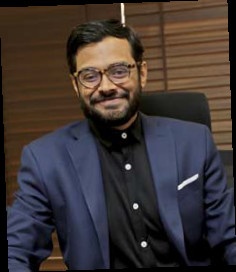
Samir Misra has an experience of working in the retail sector for more than 16 years across QSR, Skin Care and Apparel segment. Having grown from the ranks has always helped him to be closer to market conditions be it floor operations, product, people and customer needs. At V Mart, Misra is spearheading the development and execution of long-term strategies with the goal of increasing shareholder value.
Where do you see your sector in the next 10 years?
India’s retail market is expected to reach US$ 1.6 trillion by 2026. Online retail sales are forecasted to grow at a rate of 31 percent year-on-year to reach US$ 32.70 billion in 2018. The fashion sector is expected to be buoyed by women’s top wear category owing to generic inclination for western wear.
What are the Top 3 retail innovations in your opinion?
The retail innovations which I would choose are digitalisation of payment gateway and holographic representation of goods. Also forward looking retailers are creating branded proprietary checkout experience.
Does your brand have an Omnichannel/ Phy-gital strategy? If yes elaborate.
We are currently working on our Omnichannel strategy and simultaneously building capabilities towards it. It is expected to be ready for launch in the next few months.
What technological/ innovative in-store & online experiences have you introduced to your brand?
As an organisation, we are progressively adopting new technological innovations to support both back and front end. We have MIS processes digitally enabled. Additionally, we are looking at AI / ML to support us in planning product which is closer to the consumers’ requirements.
What are the future plans for your brand? How has the company grown under your leadership?
As an organisation, we have aggressive growth targets for the years to come. We have embarked on this journey of exponential growth and as a part of that, we are looking forward to doubling our store count in the coming years, saturating existing markets and entering new geographies. We are looking at riding the wave of the growing consumption story and aspirations of India’s ballooning middle class. This is aided by building a strong organisation structure, hiring highly competent people in leadership roles, defi ning and implementing processes that would provide sustainable growth. But more importantly, driving the culture of consumer centricity through authentic leadership has been my guiding principle in the last 1.5 years that I have been with V-Mart. Our efforts would be to help the middle-class youth in Tier 2,3&4 market gain access to the latest fashion in line with their growing aspirations. We believe that the middle-class youth in India use fashion as a vehicle to express their individuality and we are here to help them with that.
27. SACHI MAKER, VP- MARKETING, TRAWORLD

Sachi Maker has an experience of working in the hospitality industry for more than 9 years. She moved to the luggage/fashion space with a new vision and has brought dynamic changes for the brand with her inept marketing strategies. She has a forte in making unique campaigns that are out of the box and different from the rest.
Where do you see your sector in the next 10 years?
As we can see that the travel industry is booming and due to significant pick-up in sectors such as aviation, rail and road transport has led people to travel a lot. This has resulted in making people purchase lots of luggage bags. Today, everyone is fashion conscious and they want to have a stylish, luxurious and convenient travel bags. So, the demand is huge, and the industry will grow at a rapid pace in coming ten years.
What are the Top 3 retail innovations in your opinion?
The top three retail innovations which have made an impact are: Pop-up stores, 3D printables and Omnichannel
Is sustainability something you and your brand are actively working towards? Tell us in detail.
Currently, we are working on the eco-friendly materials and our next collection will be made totally out of it. We are a young team and are very concerned about sustainability and that is one thing we will definitely take forward.
What are the future plans for your brand? How has the company grown under your leadership?
Traworld is a three-year-old brand and so far, we have been doing well. We further plan to focus heavily on the marketing segment and make the brand a heavy content-driven company. We also intend to focus on customer experiences and make Traworld a one stop destination for everyone who is planning a travel.
28. SAURABH GADGIL, CMD, PNG JEWELLERS
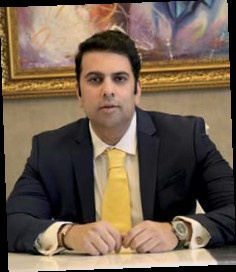
Saurabh Gadgil is a sixth- generation successor of the Gadgil family, who founded the PNG Jewellers company. After taking up the management of the family business in 1998, he went on to overhaul the entire infrastructure of the brand by streamlining the processes, embracing the latest advancements in technology and introducing quality and assurance checks. Under his leadership, PNG Jewellers has transformed into a leading national player in the organised jewellery sector, with its presence expanding from Maharashtra to other states pan India and finally reaching international markets including Dubai and USA.
Where do you see your sector in the next 10 years?
Indians hold gold in extremely high regard. The implementation of the mandatory hallmarking of jewellery, better resale values and improved transparency in transactions due to GST has had a positive impact on the branded jewellery market in the country. It will continue to grow steadily over the coming years, driven by a continued increase in the price of gold, higher number of store openings, and a massive extension of the promotional schemes period. This will be matched by an increase in the demand for branded jewellery in Tier I, II & III cities.
What are the Top 3 retail innovations in your opinion?
The innovations that I believe in are Product customisation, omnichannel and incorporation of ethical practices into brand’s functioning.
How important is O2O synergy in your opinion?
Online to offline synergy is a vital component of the modern retailer’s approach to commerce and is something that we attach a great deal of importance to. The wisdom of selling expensive, high-end goods online has been debated every now and then. An online portal should incorporate and highlight the best a brand has to offer, pairing the virtual and physical experiences through strategies such as push notifications, reactive and proactive newsletters, a multi-platform shopping interface, and cross-platform functionalities.
What technological/ innovative in-store & online experiences have you introduced to your brand?
A key innovation that we have introduced in our stores is the interactive ‘Try-On’ kiosk. This cutting-edge technology employs a sophisticated face-detection system that allows our customers to try on a vast range of jewellery pieces virtually, from anywhere anytime.
What are the plans for your brand? How has the company grown under your leadership?
Over the course of the next decade, we plan on establishing PNG Jewellers as a pan-national leader in the jewellery industry, while also bringing the skill and craftsmanship of Indian jewellery to the attention of the world. The introduction of a franchise model is central to these plans. We opened our first franchise outlet in Pune. We plan on introducing at least 20 newstores via this model in Maharashtra. There are also plans for further expansions in the Konkan region of Maharashtra, as well as international markets such as the Middle East, UK and USA.
29. SUDARSHAN GANGRADE, FOUNDER, LO! FOODS
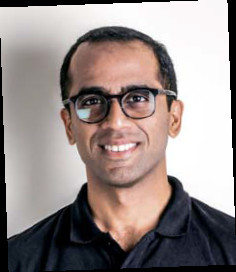
Sudarshan Gangrade, former Head of Marketing at Ola, is a seasoned serial entrepreneur with experience in successfully running companies and expertise in growth, marketing and analytics. An alumnus of IIT Kharagpur and IIM Bangalore, Gangrade has been part of India’s start up e-commerce ecosystem from its early days. Hefounded Lo! Foods in January 2019 to promote low-carb and keto friendly food items.
Where do you see your sector in the next 10 years?
Over the next 10 years, we see ‘healthy for you’ emerge as a strong category as more people turn towards healthy lifestyle choices. This category is also ripe for disruption as we anticipate big FMCG brands entering this market with their range of low carb snacks. In a real sense, this market will be a few hundred crore categories if not thousand. We believe Mom & Pop stores will play a crucial role in making this category a household name. Already Mom & Pop stores are embracing technology in terms of managing their payments, ledgers and inventories. These are good signs for new businesses like us as overall sector growth will ensure faster scale up for us.
What are the Top 3 retail innovations in your opinion?
Before the advent of e-commerce majors in India, modern retail chains like Big Bazaar and Reliance Fresh introduced the concept of private labels in India. To my mind, it is one of the best innovations in the retail business as it took Indian households by storm.
How important is O2O synergy in your opinion?
O2O synergy is more significant in terms of backend and supply chain efficiency. For the end consumers, this would not be as impactful.
What are the future plans for your brand?
Currently, we are working aggressively to scale up Lo! Foods in the online space. Our range of products is already live on top health platforms like Eat Fit and Fresh Menu. Recently, we also announced a partnership with Hyatt Place Hyderabad to launch a Low Carb and Keto Friendly all-day menu which is powered by Lo! Foods. We plan to scale up our online presence as we have already started selling through leading e-commerce sites like Amazon and Big Basket. The next phase of expansion would include stepping up our offl ine play where our range of products will be available at premium shelf spaces. In a short journey of 7 months, our customer repeat ratio is 35percent and our range of products including Lo! Atta is seeing healthy traction from home chefs and professional bakers alike.
30. SHIVANI PODDAR & TANVI MALIK, CO-FOUNDERS FABALLEY

An Economics graduate from Delhi’s Lady Shriram College, Tanvi Malik did MBA in Brand Management from MICA Ahmadabad. She started her dream project, an inclusive, accessible and fashion-forward brand for Indian women – FabAlley, and later Indya where she spearheads design, marketing, product and communication. Her role gives her endless opportunities to create wonderful fashion as both brands are truly democratizing fashion by providing access and affordability to women.
What are the Top 3 retail innovations in your opinion?
The top three retail innovations for me are: Merging of online, mobile, and offline customer experience, AR and visual search.
How important is O2O synergy in your opinion?
O2O is a crucial retail synergy, and one which every brand should incorporate sooner ratherthan later. Increasingly, the line between online and offline consumers is blurring and brands that understand how to service their consumers efficiently agnostic to where the consumer is shopping from, are brands that will grow and scale sustainably.
Does your brand have an Omnichannel/ Phy-gital strategy? If yes elaborate
Indya is an Omnichannel brand with a healthy mix of online and offl ine distribution. About 50 percent of our business comes from the online segment and our website.
In terms of the offl ine market, we have 19 brand-owned stores that were started in the last 16 months. These EBOs are present in Delhi, Bombay, Bangalore, Pune, Chandigarh, Ludhiana, and many more cities and the plan is to take this up to about 35 stores by the end of this year. We’re also very excited about launching our first exclusive store for FabAlley in August this year.
What technological/ innovative in-store & online experiences have you introduced to your brand?
We are working on introducing digital screens in pilot stores where our customers can browse through our look-books, new collections and have access to experiential styling features. The idea is to provide the consumer with an endless aisle experience. Parallelly, we are also working on enabling online-to-offl ine retail, by adding features such as try-and-buy, free garment alterations and other features to our online consumers.
What are the future plans for your brand?
High Street Essentials Pvt. Ltd. (HSE) has grown from Rs 20 lakh monthly sales in 2013 to almost `10 crore in monthly sales in FY19. The growth has come from expansion in both the online and offl ine segments along with constant product expansion. In terms of offl ine presence, Indya has 19 company-owned stores which were launched in the last 16 months. This number is going to go up to 35 stores by the end of this year. The brand is also present in large format stores like Lifestyle, Central, Globus and Ethnicity.
FabAlley is present at more than 100 shopin- shops with Lifestyle, Central and Globus as well and is launching its first EBO in August ’19 at Elante Mall Chandigarh.
31. SHREYANS SURANA, DIRECTOR, BAAZAR STYLE RETAIL PVT. LTD.
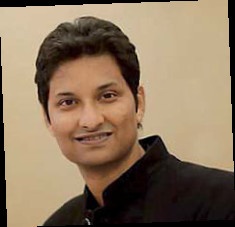
Shreyans Surana, Director, Baazar Style Retail Private Limited is a member of the Institute of Chartered Accountants of India and also the Institute of Company Secretaries of India. He oversees the financing strategies, capital structure, administrative and corporate legal functions of the brand. He is responsible for the overall working of the company and is instrumental in making strategic decisions for the company. He has also worked with V.Singhi & Co and PricewaterhouseCoopers in the past.
What are the Top 3 retail innovations in your opinion?
Merging of online, mobile, and offline customer experiences, payment experience and controlling in-store transaction data are the top three innovations.
Where do you see your sector in the next 10 years?
Transition from traditional retail to organised retail is taking place due to changing consumer expectations, growing middle class, higher disposable income, preference for luxury goods, change in the demographic mix, etc. This is further intensified with the convenience of online shopping, multiplicity of choice under one roof (Shop-in-Shop), and the increase of mall culture, etc. These factors are expected to drive organised retail growth in India over the long run. The overall retail market in India is expected to grow at 12 percent growth rate per annum.
How important is O2O synergy in your opinion?
O2O space is slated to become a multi-trillion-dollar industry soon. By thoughtfully utilising the O2O data and designing campaigns that make customers feel wanted, retailers can witness a complete transformation in their growth and engagement strategy. In the age of customer-centric marketing, retailers can deliver Omnichannel experiences which create an emotional connection by employing marketing automation.
What technological / innovative in-store & online experiences have you introduced to your brand?
We have introduced successful implementation of HRMS, Matrix, ARS Lift and Godrej Racking system across regions. We have strengthened networking with leading external threat protections (Firewalls) along with ARS Lift & Godrej Racking system has been introduced. We are completely working with the Ginesys software and various other software to enhance customers experience.
What are the future plans for your brand?
Baazar Style Retail Pvt Ltd has gone through a major expansion in the year 2018, where the company has grown from 27 stores to 63 stores, a whopping 200 percent growth. In other words, the company took a giant step from a turnover of Rs 304 core to Rs 541 crore. We are planning to operate around 100 stores across India in the financial year 2019 – 2020.
32. TABBY BHATIA, DIRECTOR, VOGNAOW
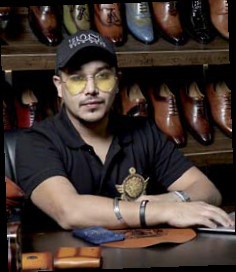
After completing his studies, Tabby Bhatia started his own brand of footwear and accessories. His main focus was to create his brand’s presence in the domestic market and then widen this to international totally, which he intends to achieve in the coming five years.
Where do you see your sector in the next 10 years?
It is great to see that e-commerce sector is growing 5X of what it is today, considering the internet penetration in the country. With digitalisation taking over, more customers will be able to gain access to retail outlets online. Also, advanced banking services are helping both sectors where EMI facilities are making it easy for customers to purchase desired products. Retail is only going to get bigger in the coming years.
What are the Top 3 retail innovations in your opinion?
My top three innovations are: Easy returns and exchange policies, Online connections with offline for stocks and product customisation.
How important is O2O synergy in your opinion?
Online to offline synergy brings consumer into the real world to make purchases in physical stores. It helps in building strong relationships between buyers as one can return or purchase products online at a physical location and vice versa. The brand gets a chance to directly listen to customers’ requirement which leads to bridging the gap between the two.
What technological/ innovative in-store & online experiences have you introduced to your brand?
Our specialised AI software will help our salespersons in tracking all selling aspects including selling price, color, category etc. to pitch more for the better targeting of sales. The main motive of our brand is to cater to the best service to make the maximum permanent customers for the brand. Keeping this in mind, we have initiated a service to people to get experience, purchase and have that product delivered at home without any extra effort. Also, the customer can return products they have bought online to stores.
What are the future plans for your brand? How has the company grown under your leadership?
This year we are concentrating on an offline plan, entering the offline market with a few stores in Jalandhar. By 2019, we plan to open 2-3 flagship stores in India. The brand already has an outlet in UAE, and we desire to strengthen our business in the outer market.
We started this business in 2015 with an investment of Rs 1.3 crore and have today turned it into Rs 12 crore profit. Moreover, we are able to gather celebrity and cricket player eyes to set our benchmark. We would say it’s our entire team’s hard work and luck that this year we were chosen by BCCI to design 55 travel kits for entire Indian cricket players for World Cup series 2019.
33. VIKRANT BATRA, FOUNDER CAFÉ DELHI HEIGHTS & NUEVA
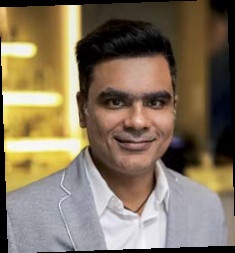
For Vikrant Batra, food has always been an integral part of his life and hence he has always tried to encapsulate it through his work in the form of quality fl avours and consistency blended with the look and feel of the dish in its totality. With a vision to change the way people perceived cafes in India, Batra joined his family business and opened fi rst outlet of Café Delhi Heights in 2011. Over the years, under his leadership, Cafe Delhi Heights won numerous awards and also launched a Peruvian and Modern cuisine bar and diner called Nueva.
Where do you see your sector in the next 10 years?
I see awareness, innovation and experimentation on the rise as food sector has a very bright future. With evolved palates that are ready to explore and appreciate different styles of cuisines, the food sector is on the verge of entering new avenues and a massive and versatile growth in the upcoming 10 years. With new developments from International chefs entering the Indian market to upcoming locations and improved infrastructure, India will be witnessing development in the industry.
What are the Top 3 food innovations in your opinion?
Innovation in the food industry combines technological innovations along with social and cultural innovations. From food going online to organic and seasonal food offerings coming back, the industry has seen many food innovations. Food presentation, too, has gone under a series of innovations and has become as important as the taste today.
How important is O2O synergy in your opinion?
A business strategy model – O2O finds consumers online and brings them offline. The following model is complementary rather than competitive as it uses both mediums to increase the sale of any brand. In today’s digital age, O2O model is very important, as it is one of the fastest ways of marketing owing to huge success of businesses.
Is sustainability something you and your brand are actively working towards? Tell us in detail.
The three pillars of any sustainable model in the food and beverage industry comprise of customer experience, quality of the product & consistency. Serving large hearted portions of good quality food, our brands have always stood true to its offerings since day one. Staying true to our concept and thought along with customer satisfaction has been our mantra of success that has helped us achieve what we are today.
What are the future plans for your brand?
Café Delhi has expansion plans of launching in Chandigarh and few more locations in Delhi and NCR. The brand is ready for aggressive expansion to other cities like Hyderabad, Bangalore, Chennai and more.
34. UMANG TEWARI, FOUNDER, BIG FISH VENTURES
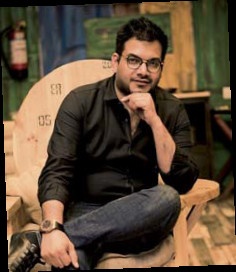
Umang Tewari is the face behind ‘The Junkyard Café, GaramDharam and Local’, which is one of the favourite destinations for Delhi’s Millennial population due to its unique concepts and entertainment themes. Coming from a family that is wholly into real estate, he decided to venture into hospitality purely out of sheer passion and has revolutionised the nightlife of Delhi. His customers and their love and support are what gives him the courage to take risks and experiment with his unique concepts.
Where do you see your sector in the next 10 years?
A food loving country, India has never experienced this big a rise in the number of diners before. With businessmen and investors investing in this industry to small and big chefs venturing their own cafes and restaurants, the industry is changing its shape and size tremendously. The sector is evolving and expanding along with international brands entering the Indian market. From restauranteurs and chefs bringing international cuisines to new food innovations to more and more women chefs taking the lead, the sector is in for aggressive expansion in the following ten years.
What are the Top 3 food innovations in your opinion?
With the coming of Artificial Intelligence and Digital Marketing, the food industry has largely taken over the internet. From food delivery apps to reservation portals and social media portals, the avenues have widened. Along with this, the chefs and restaurateurs have begun to experiment with different styles of cooking and unique cuisines like Nostalgic Indian, Peruvian and more. From molecular gastronomy to using dehydration techniques and more.
How important is O2O synergy in your opinion?
The synergy of Online to Offline is very important for any industry. With a current advantage of e-commerce over traditional commerce, it is easy to track the consumer behaviour, payment information and customer targeting. O2O not only bridges these gaps but also makes it easy to track the conversions of offline transactions and hence enables brands to target them directly too.
What technological/innovative instore & online experiences have you introduced to your brand?
From online discounts and table reservation services, our brands also host engaging contests and customer feedback programmes online. Whereas, in terms of innovative offline experiences, we indulge in hosting themed nights, new menu launches, customer engaging events and feedbacks to upgrade our customer experiences.
What are the future plans for your brand?
The company has grown from one outlet to around 11 outlets which are successful and well-established brands of the capital. We are working on more concepts and shall be announcing them soon. Besides new concepts, we are also working on the expansion of existing ones to Tier II & III cities.
35. VINAY CHATLANI, CO FOUNDER AND CEO, SOCH

Vinay Chatlani is a retailer by profession, an interior designer by passion and a fitness enthusiast. As CEO of Soch, he defines the road map for all creative design strategy, operations and marketing at one of the most popular ethnic specialist fashion chain. A graduate from the University of Miami with a major in Entrepreneurship and a minor in Marketing, Chatlani kick-started his career in 2002 by setting up a promotions company along with his friends targeting some of the most exclusive restaurants, bars, lounges and night clubs in Miami. In 2003, Chatlani moved to Bangalore from Miami and joined his family business, with a vision to establish Soch as one of the leading ethnic wear brands in the country
Where do you see the sector in the next 10 years?
We are confident that the ethnic wear market will witness a rising demand in the next decade. This is going to be backed by the rise in disposable income from a growing middle class, the influence of social media and celebrities in buying decision as well as easy accessibility with e-com and Omnichannel routes.
What are the Top 3 retail innovations in your opinion?
The retail industry is ever evolving with several innovations and technologies being employed in the sector. The top three according to me are Omnichannel retailing which has enabled retailers to bridge the time and space gap with consumers; Opening up markets and consumer segments that were previously under-penetrated. Pop up stores is also a great initiative, if used well they can test the markets by creating a buzz around a limited edition or launch concept.
How important is O2O synergy in your opinion?
Today, the consumer has evolved and expects a shopping experience that encompasses a seamless integration of brick-and-mortar with online platforms. E-commerce is no longer just limited to the web and several brands now realise this and are opting for a hybrid O2O model. Features such as in-store digital kiosks, online order and instore picks help in creating online and offline synergies leading to the superior consumer experience.
Does your brand have an Omnichannel strategy?
We are building our Omnichannel capabilities by integrating all our stores and distribution centers to provide our customers with an enhanced shopping experience at EBOs and also online on our e-commerce website.
36. VASANTH KUMAR, MANAGING DIRECTOR, LIFESTYLE INTERNATIONAL PRIVATE LIMITED

As the Managing Director of Lifestyle International in India, Vasanth Kumar is spearheading the brand’s aggressive growth plans since its launch in the country. With an illustrious marketing career spanning 23 years, Kumar has a rich and diverse experience in marketing, sales and retail management in the apparel, FMCG and consumer durable industries in India. In February 2005, he joined the Landmark Gulf Group as President, Max Retail Division, Lifestyle International – headquartered in Bangalore and moved up to become the Executive Director of the brand.
Where do you see the retail sector in the next 10 years?
In the next ten years, the retail sector will grow at an immense pace and will offer a highly intuitive, personalised shopping experience to discerning customers.
How important is O2O synergy in your opinion?
In my opinion, O2O synergy is important for brand building as it provides consumers with a seamless and hassle free shopping experience.
What technological/innovative instore and online experiences have you introduced to your brand?
Incorporating technology, that is both interactive and engaging, has changed the dynamics of retail. Today, technology in your day to day operations is not just about enhancing business functions, it is about providing a memorable shopping experience as well. At our stores, we have The Self-Checkout Kiosk, where customers can complete the payment transaction in a few simple steps on their own, Mobile POS for billing products such as watches, fragrances or cosmetics Fitting Room Assistance’ program that allows for size retrieval with the help of technology Click & Collect– an initiative that allows customers to order online and collect merchandise offline from any store, In-store Endless-Aisle Initiative helping the customer to find the missing size our online platform.
Does your brand have an Omnichannel/Phy-gital strategy?
Lifestyle provides seamless, hassle-free shopping and an Omnichannel experience with its online store lifestylestores.com. By ‘Click & Collect’, customers can order online and collect merchandise in-store. With a countrywide presence across 78 stores, 44 cities & delivery to over 26000 pin codes, Lifestyle seamlessly brings to life trends across all touch points of every fashion journey – including online, mobile, instore, and social media.
What are the future plans for your brand? How has the company grown under your leadership? What are your online expansion plans?
We plan to launch one store every 45 days for the next 2 years along with steady growth in our online retail footprint. The vision for the future is to make Lifestyle’s Omnichannel experience a seamless one and ensure that we provide a frictionless fashion shopping experience for customers across our stores and online. We are looking at a steady growth in our online retail footprint from here on.
37. VISHWAS SHRINGI, CEO & FOUNDER, VOYLLA
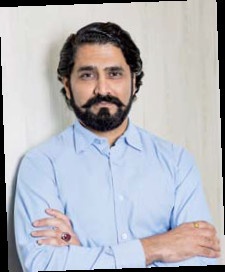
Vishwas Shringi, an IIT Madras alumnus and Carnegie Mellon graduate, returned to India to set up Voylla in 2010. Since then, he has been steering the course of the business, building a brand which is now synonymous with innovation, quality and accessibility. Known for his relentless drive, hands-on approach and proven leadership qualities, Shringi has helped Voylla become one of the largest fashion jewellery brands in the country in a very short time.
Where do you see your sector in the next 10 years?
There is tremendous potential in the jewellery segment which is set to grow exponentially as women are becoming the decision-makers and are moving towards an evolved sense of style. We expect this sector to do very well in the coming ten years. Government controlled policies are stemming the surge in Chinese cheap imports and the industry is immensely benefitting from these policies. Fashion jewelry is growing at 20 percent+ CAGR YoY. At this rate, it will be more than a $10 billion category in the next 10 years. We at Voylla, have been the leaders in creating and owning this category – branding fashion jewellery with an Omnichannel presence. We hope to consolidate our lead and keep growing the category as well.
What are the Top 3 retail innovations in your opinion?
For me, the biggest innovation in any retail business is product innovation, price competitiveness and to perfect every possible platform where the product is available.
How important is O2O synergy in your opinion?
Omnichannel strategy is important for most categories, especially in categories where touch and feel are not very important. However, for loyal customers, O2O is a good transition as they are already familiar with the brand and the quality, so design visualisation can help them with purchase decisions online.
Does your brand have an Omnichannel/ Phy-gital strategy?
Yes, we do! Our customers can place orders online and get products delivered to the stores. We are working on further enhancing customer experience where customers can return, exchange at ease at any channel.
38. VINEET GAUTAM, CEO, BESTSELLER INDIA
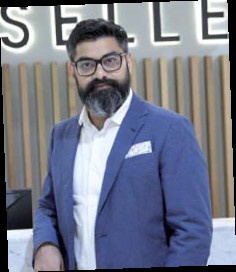
With over 18 years of experience in the retail industry, Vineet Gautam has worked across various sectors including food, fashion & telecom. A graduate in Hotel Management from IHM-Delhi, Gautam is heading the operations, marketing, brand management and business development for all the Bestseller India brands – Jack & Jones, Vero Moda, ONLY and Selected Homme – since 2010. In the current role, he is focusing on driving business, strategy and profitability across brands.
Where do you see your sector in the next 10 years?
In the next 10 years, the retail sector will be more organised and refined. With a greater number of retailers adopting the Omnichannel strategy, the retail sector will offer much more convenient and seamless shopping experience to the customer.
Increased adoption of retail technology and innovation concepts will help the sector keep up with the constantly changing purchase patterns and help understand the consumer’s buying behaviour to the extent of even helping predict consumer shopping trends. While the increasing disposable incomes coupled with the infl ux of foreign players, as well as local players, is set to make the sector more competitive and cluttered.
What are the Top 3 retail innovations in your opinion?
The three innovations which have impressed me are; Same Day Delivery, Social Shopping and Smart Mirrors.
How important is O2O synergy in your opinion?
O2O synergy is extremely important in my opinion, as any brand looking to retain consumer loyalty needs to tap into the online and offline potential of servicing the consumer. Consumers are fl ooded with a plethora of product offerings from various brands. In such times, it is extremely crucial to provide a seamless shopping experience through every touchpoint in the consumer journey in order to maintain brand loyalty.
Does your brand have an Omnichannel/Phygital strategy?
Yes, at Bestseller, we try and ensure that no matter what platform our consumer chooses to shop from – be it online or offline, he or she has the same brand experience and can enjoy seamless shopping experience.
What are the future plans for your brand? How has the company grown under your leadership?
I strongly believe in the concept of teamwork and building core competencies within teams. During my journey, I have watched the strength of our team grow from a small team of 42 to a robust team of 3000+ employees today. Through our collective efforts, we went from operating 15 brick-and-mortar stores, to 1500+ sales point pan India. We aim to further diversify and grow our product offerings across all our brands and continue to bring the best of international trends and make them relevant for our Indian consumers. By 2020, we aim towards making Bestseller the largest fashion retailer of the country Leather Talks (LT) journey started inform of an EBO in AC Market, Kolkata in 1973. By 1984, the brand had four EBO’s in Delhi, Mumbai and Hyderabad. LT was the fi rst brand to launch luxurious gent’s belts with locally made reversible buckles with original golden and silver polish. The great exuberating craftsmanship , product quality with innovation and great customer service helped it achieve a goodwill in a short span of time. Then the LT journey took a turn to the goodwill products/ promotional goods market with the top 150 corporate of India as its clients. In 2010, LT launched the MRH Leather Goods Pvt. Ltd, now the parent company and the brand owner of Leather Talks and Vaunt. MRH made a national presence by launching both the brands in the Indian Stationery market through the MBO (Multi Brand outlet)mode and acquired a channel comprising of India’s leading organised stationery sellers within a year’s time.
39. YASHOVARDHAN GUPTA, FOUNDER & DIRECTOR, TORERO CORPORATION
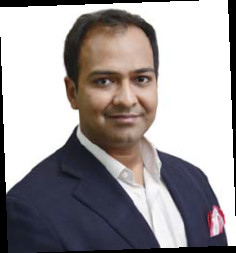
After pursuing MBA, Yashovardhan Gupta decided to launch Torero which is modelled on the licensee business model of Luxottica. Torero Corporation Private Limited is a global licensee for Cross and Police leather accessories. The brand houses leather accessories which are created, manufactured and exported to brands like Mont Blanc, Hugo Boss, Giorgio Armani, Cerruti 1881 and Guy Laroche in more than 40 countries.
Where do you see your sector in the next 10 years?
We have three major distribution channels – retail, e-commerce and business gifting. All three are expanding excessively and we are very optimistic about the future. The retail sector in India is emerging as one of the largest sectors in the economy. The total market size of the Indian Retail Ireached is forecast to increase to US $1,200 billion by 2021 and US $1,750 billion by 2026. Thee-commerce industry has been on an upward growth trajectory and expects to surpass the US to become the second largest e commerce market in the world by 2034. The e-commerce market is expected to reach US $200 billion by 2026. The business gifting section is also an area of growth for us especially in the pharma and insurance companies. We would like to replicate our success formula in for business gifting in other areas as well.
Does your brand have an Omnichannel/Phy-gital strategy? If yes elaborate.
The global distribution format is moving from pure offline sales to a hybrid model of offline and online sales. It is critical to move with the times and adapt in order to be ready for a future customer who would be looking to buy in the Omnichannel world. We have consolidated our sales in the offl ine retail world globally since our inception and recently launched our e-commerce store front on amazon India in 2018. We plan to launch our e-commerce distribution in Europe in France, Germany, Italy and Spain. We would like our customers to have the same experience when purchasing our products offl ine as well as online.
What are the future plans for your brand?
We are looking to expand within our core competency as global licensees for international brands. We want to bring in additional brands and continue expanding our distribution network through it.







